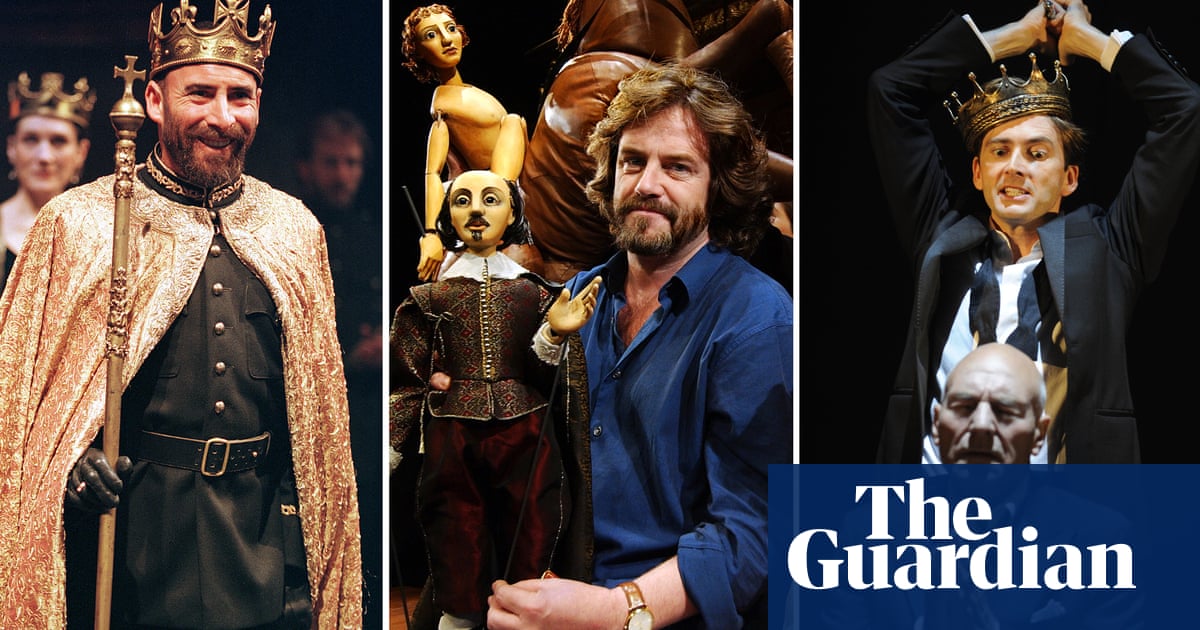
Is Romeo pissed?
Romeo and Juliet, 1979
O, I am fortune’s fool! It’s the opening night of my production of Romeo and Juliet, at the Mayfair theatre in London, and Romeo has just fainted. It’s 1979, and I am 20 years old.
It’s the start of Act 3, and in these hot days in the square in Verona, the mad blood is stirring. That king of cats, Tybalt, has just accused Mercutio of sleeping with Romeo, and prompted a fight in which Mercutio is killed. Romeo flies at Tybalt, stabs him to death, and prompted by Benvolio flees, exiting downstage left.
A scene later, in Friar Laurence’s cell, I can’t understand what is happening. The Friar seems to be holding Romeo up, and Romeo seems to have forgotten his lines, and is muttering the tirade incomprehensibly. When the nurse enters and asks where Romeo is, the friar tells her: “There on the ground, with his own tears made drunk.” Drunk? Can it be that Romeo, with all the nerves surrounding this performance, has actually got pissed? Unfortunately, unbeknown to me, exiting from the previous scene with the line “O, I am fortune’s fool!” Romeo had crashed straight into the wall in the wings, knocked his head and passed out. Somehow, with the friar’s help, he makes it through the scene.
This is only one of a catalogue of disasters that haunts that night. Some misunderstanding that morning meant we had not been able to get into the theatre to prepare for our glittering gala one-off performance. When we did get in, the set did not fit on the stage, and had to be swivelled round by 30 degrees. There had been no time to rehearse, no time to do the lighting or even run through the fights properly.
We are an ambitious student company, and have invited any number of influential arts folk to attend our debut. But as the two hours’ traffic of our stage threatens to drag on closer to four, I see all our hopes draining away. My sister Jo is sitting next to me. She slips a reassuring hand into mine. By the time the show finishes, I have nearly wrung it off.
“That’s it,” I thought, “it’s the end of my career.”
I pointed to the spider, unable to speak
Macbeth, 1999
“Macbeth, Macbeth, Macbeth! There you are I’ve said it, and not been struck down.”
That’s how I began our first day of rehearsals for Macbeth. The so-called curse of this play has nothing to do with hocus-pocus. It is just very difficult to make the production match up to the audience’s own imaginations, and the effect the play had on each of them when they read it for the first time. So I banned the use of the silly phrase “the Scottish play”.
We recently had a production of Twelfth Night that was beset with challenges: serious illness, stage fright, etc. No one called it “the Illyrian play”.
But we examined our individual reactions to a word that appears most frequently in Macbeth. The word “fear”. I asked everyone to tell me when they had genuinely experienced fear. The accounts differed widely: one told of losing their child at the beach and fearing he had been swept away; another of slipping while rock climbing; another of lying in bed and listening to an intruder break into their house.
My own experience involved the re-emergence of a childhood phobia. Tony [Doran’s husband, the actor Antony Sher] and I were on safari in South Africa. We were sitting high up at the back of the open-top jeep. I was wearing a singlet, shorts and flip-flops. We were in pursuit of a leopard and had come off road and into a stand of acacia thorn trees. The leopard had disappeared into a dense thicket, and all eyes were down and focused for any movement. Silence.
After a few minutes, I noticed something twitch in my peripheral vision just to my left. I turned my head slightly to discover a large spider, hanging like a clawed hand, just inches from my face. I held my breath. The giant spider’s legs were tiger-striped black and orange and it seemed to pulse in a huge yellow web, but as I followed the web up with my eyes, I realised it was not the only one. We had crashed into what seemed like a colony, draping the entire grove with saffron webs and at the centre of each of them another pulsing spider. I started to suck the air in rapid pants. Tony by my side noticed my silent panic and asked if I was alright. I pointed to the spider but found myself unable to speak.
He called to the ranger sitting in the driver seat.
“Oh, OK,” he said, “yeah, don’t worry. They are golden orb spiders, they are actually quite interesting. They all co-ordinate their mating at this time of year, which is why …” “Do you think we could just go,” Tony said, realising that I was by now hyperventilating badly.
The ranger cranked the jeep into reverse. But as he pulled back, the jeep hit the trunk of the tree, dislodging spiders which fell on to my hair and bare shoulders. I curdled. I began to feel light-headed, and my hands had stiffened into involuntary claws.
“Don’t worry, mate, they’re not poisonous.”
I pulled a waterproof poncho over my head, and, like Kenny from South Park, I pulled the cord tight.
Each of the stories the company told produced fascinating physiological effects on the listeners. People started to hold their breath, or to breathe faster. Scientists tell us that this innate fast breathing response has an effect on our brain, and in particular to the amygdala, the part of the brain that processes emotions. It may be that by providing more oxygen to the amygdala it prepares us to think more quickly and prepare our flight response to fear.
Our job as a company, now we had noticed this, was to tap deep and prepare our audiences to engage, and to find ways of allowing Shakespeare’s account of terror to pull them to the edge of their seats and grip their breathing.
The previous year, I had directed a double bill of Tom Stoppard’s The Real Inspector Hound, and Peter Shaffer’s Black Comedy for the Donmar, at the Comedy theatre in the West End. Shaffer’s play opens in total darkness. You hear the characters on stage chattering breezily away. Suddenly, brilliant light floods the stage. The characters on stage freeze. One of them says, “God! We’ve blown a fuse.” The rest of the play takes place in full light while the characters flounder around in the dark. Peter told me he had had the inspiration watching the Peking Opera, which uses this same convention.
At a preview, on tour at the Yvonne Arnaud theatre in Guildford, I was watching from the back of the auditorium. We had ensured that we had a total blackout for the necessary first few minutes. We had even covered over the little red bulbs on the lanterns and been given permission to conceal the green exit-signs briefly.
Within moments, I heard someone shuffling quickly up the aisle towards me. A woman in deep distress bumped into me. “I can’t bear it,” she gasped, “I can’t bear the darkness. Where is the door?” I tried to calm her by pointing to the lamps in the lighting box behind me. She continued to grip my hand tightly. As soon as the stage lights came back up she returned, still flustered, to her seat.
Now if that level of sensory deprivation can have that effect in a 60s “light” comedy, I thought, how might it work for Macbeth.
When the skull arrived, the prop department’s dog went crazy
Hamlet, 2008
“Nowadays people sit through Shakespeare in order to recognise the quotations.” So said Orson Welles, and he may be right. Hamlet, of course, is full of quotations. Our job in the theatre is to fresh-mint some of those famous lines. But how do you do that? How do you “look with thine ears”, as King Lear says?
When he played Hamlet at Stratford in 1984, the late-lamented Roger Rees decided to try to surprise the audience one night with that most famous line: “To be or not to be.” He would rush forward to the front of the stage with an urgent immediacy, as if the line had just emerged from the quick forge and working house of thought. The cue came. He hurtled down to the front of the stage, and promptly forgot the most famous line in the canon … and if that wasn’t humiliating enough, he was then prompted by a member of the audience.
When I began our production, we discovered a rather unconventional way of fresh-minting another of those lines whose fame transcends the play. As the gravedigger presents Hamlet with the skull of his father’s old jester, he declares: “Alas poor Yorick!”
In 1982, a man had actually bequeathed his own skull to the RSC to be used in a production of Hamlet. His name was André Tchaikowsky. He was a Polish pianist and composer. The undertaker had balked at the idea of removing the head from one of his customers as this was not regarded as normal practice, and quite possibly illegal. Permission had to be sought from the Home Office. Eventually, the local hospital removed the head, and accomplished the job that presumably the cold clay of the grave did for Yorick.
Whatever the process, one day the skull arrived in the prop department at Stratford in a Delsey tissue box, and when it was opened, Crusty, the prop-shop dog, went crazy. The skull still stank (“Pah!” as Hamlet says, “My gorge rises at it”) so it was put up on the roof in an onion bag, until the weather – and perhaps the birds – had done the rest. Then it was stored in a box on a shelf, where it had stayed ever since: no one had chosen to cast André as Yorick. So, on the first day of our rehearsals, as usual, I welcomed the actors and announced the parts they would be playing, and then I said, “Ladies and gentlemen, let me introduce you to the final member of our company.” Pulling on some purple latex gloves, I opened a cardboard box, and lifting out the skull, I said, “This is André. He will be playing Yorick.”
A silence fell on the room.
I offered to hand the skull to any of the team who wanted to touch it. Some recoiled, some were drawn towards it in grim fascination. Cicely Berry was present, and declined the skull with a smile, saying she was close enough to that state herself. Many were disturbed by such a vivid memento mori. Folk don’t generally keep death’s heads on their desktops these days. Imagine, next to your calendar, between your laptop and your paperclips.
Whatever the reaction, that line, “Alas, poor Yorick”, never languished into cliche in our production. The skull never became just another stage prop. As Hamlet peered at the old comedian’s skull, he stared into those hollow eye sockets and saw his own mortality staring straight back at him.
And so did we.
These extracts are taken from Greg Doran’s My Shakespeare: A Director’s Journey Through the First Folio, published by Methuen Drama. To support the Guardian order your copy at guardianbookshop.com. Delivery charges may apply. Doran’s production of Cymbeline opens at the Royal Shakespeare theatre, Stratford-upon-Avon, on 22 April.












